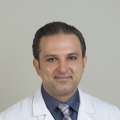Santa Monica resident Jernej Čopič recently concluded a four-week kayak adventure in his native Slovenia with two very special companions: his childhood best friend and kidney donor Dejan Kralj, and his beloved cello.
The trip came just one year after Čopič’s second kidney transplant at UCLA Health, in which he received a kidney from Kralj, a Slovenian whitewater kayaker who competed in the 2000 Summer Olympics.
A long journey to health, aided by music
Čopič, now 48, had once had similar whitewater kayaking aspirations, but those plans were derailed when he was diagnosed with kidney disease in 1991, at age 16.
Although the disease progressed slowly, by 2008, Čopič’s kidney function had deteriorated to the point that he required dialysis. That same year, after it was determined that his mother was a suitable match, Čopič underwent kidney transplant surgery at UCLA Health.
After functioning well for about a decade, the donated kidney started to shut down in 2018.
Čopič, a cellist as well as an economist and mathematician, turned to music to sustain him as his health worsened. By 2021, he was back to receiving dialysis twice a week. After each treatment, he’d retreat to his local coffee shop and play his cello. Soon, he was playing there every weekday morning.
On Sundays, Čopič would strap his cello to his back and ride his electric bicycle to two local farmers’ markets, where he’d play cello for about four hours. One, the Hollywood Farmers’ Market, was about 12 miles from his house and the other, the Atwater Village Farmers’ Market, was more than 20 miles away. “It was quite demanding physically, but it was a big source of pleasure for me,” Čopič recalled.

Although his kidney function continued to decline, resulting in painful cramps and a couple of attacks of gout, Čopič credits his music and his ongoing exercise with helping stave off depression and an even more precipitous decline in kidney function.
“I started dialysis with about 7% kidney function, which is quite low,” he said. Although he was expected to progress from twice-weekly dialysis to three times a week, that didn’t end up happening: “What I was doing seemed to be helping,” he said.
Čopič describes his commitment to music during this time period as “essential.” Playing for others gave him something to focus on, and the sense of community helped him feel less alone.
The act of playing had other physical benefits too, he said: It forced him to focus on his breathing in a structured way, similar to what’s done as part of meditation. “When I play, I try to be very relaxed,” he explained. “I remember how much emphasis I put on that during my time on dialysis.”
Finding a match in a lifelong friend
Soon after Čopič received the news that his donated kidney was starting to shut down Kralj offered to get tested to see if he could donate one of his kidneys. Despite not being a close relative, Kralj was determined to be a good match. But another hurdle remained even after the results came back: Kralj was in Slovenia, and Čopič was in Southern California.
Despite this being outside of the standard protocol, Gabriel Danovitch, MD, medical director of the UCLA Health Kidney Transplant Program, with whom Čopič had stayed in contact ever since his 2008 transplant, intervened and made it possible, he said.
Both Čopič and Kralj checked into the hospital at UCLA Health at the same time in October 2022, with Kralj wheeled into surgery about 30 minutes before Čopič.
“The day after the transplant, while we were still quite sedated, Dejan visited me in my room, because he could already move around,” Čopič recalled. “We embraced – we were laughing and very happy. And a few days later, we laughed because we were both severely constipated after the surgery.”
Even before the procedure, the two had hatched the plan for their kayaking trip. “During the two-year period around the transplant, we communicated every day for at least half an hour,” Čopič said, and the plans slowly took shape.
A celebratory journey
Although Čopič had kayaked extensively in his youth, the trip was physically challenging, especially for someone who had been on dialysis only about a year earlier. “I’d only been in a kayak once during the prior two years,” Čopič said.
As part of the trip, which began Sept. 9, Čopič paddled about 20 miles each day, carting about 70 pounds of gear, including his electric cello. He was forced to sit out the first couple of days due to illness, but met up in the evenings with Kralj and other friends who had joined them.
There were other minor setbacks too, including a storm that brought heavy winds and rain and forced them to pause their trip for a couple of days. At one point, one of the strings on Čopič’s kayak rudder snapped, necessitating a quick repair.
His cello also required repair after a small wood piece broke off the first time Čopič took the cello out of its waterproof wrapping. “It broke after I played one piece, literally,” he said. He re-attached it with borrowed silicone glue, which then took two days to dry before the cello was once again ready to play.
Still, Čopič characterized the trip as “amazing, both emotionally and physically.”
It took him several days of kayaking to get into a more normal state of mind, he said, given the immense stress of the last couple of years: “The effects of steady aerobic physical activity, inches away from the ocean and the waves and the wind – all of that does wonders.”
Playing his cello was also an integral part of this, he said, with music helping him feel like his life “was coming back to a more normal state.”
Čopič returned to Los Angeles in late October and had a check-up at UCLA Health with his transplant nephrologist, Suphamai Bunnapradist, MD, and his ongoing nephrologist, Mohammad Kamgar, MD. His lab results showed that his blood filtration rates had improved from what they were prior to the trip.
“Apparently, the health benefits of the kayaking journey, with music along the way, are great,” Čopič quipped, although he noted that there may or may not be a causal relationship.
Čopič has already held one post-trip reception and concert in Slovenia to help raise awareness and funds for pediatric kidney patients and hopes to hold a similar event at a friend’s art gallery in Los Angeles by the end of the year.
“Dejan and I only partly anticipated how important the kayaking would be for my recovery – and his,” Čopič said. “The kayaking trip was something that we needed to do to get closure to these strange times.”
Lisa L. Lewis is the author of this article.






